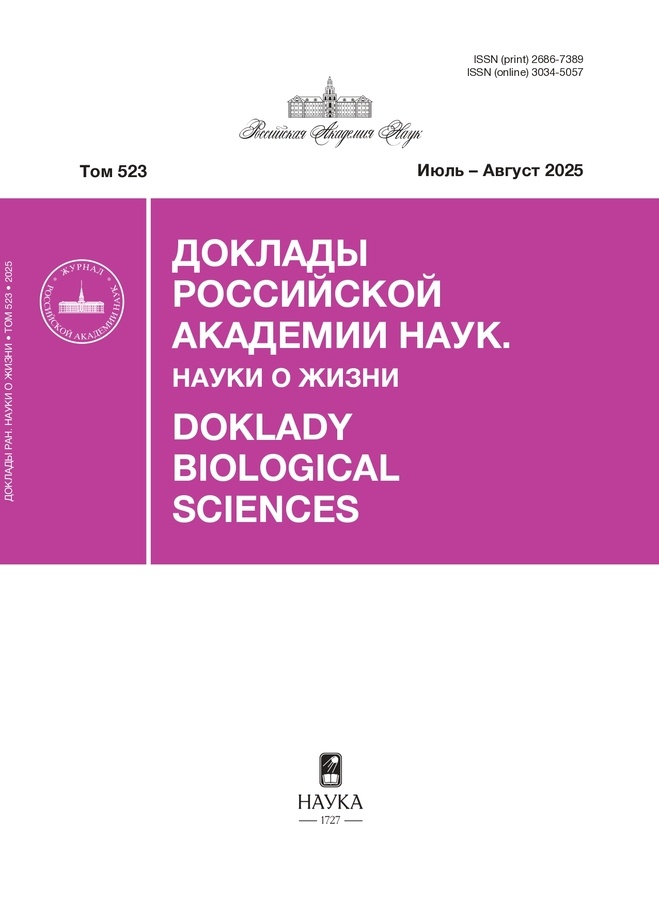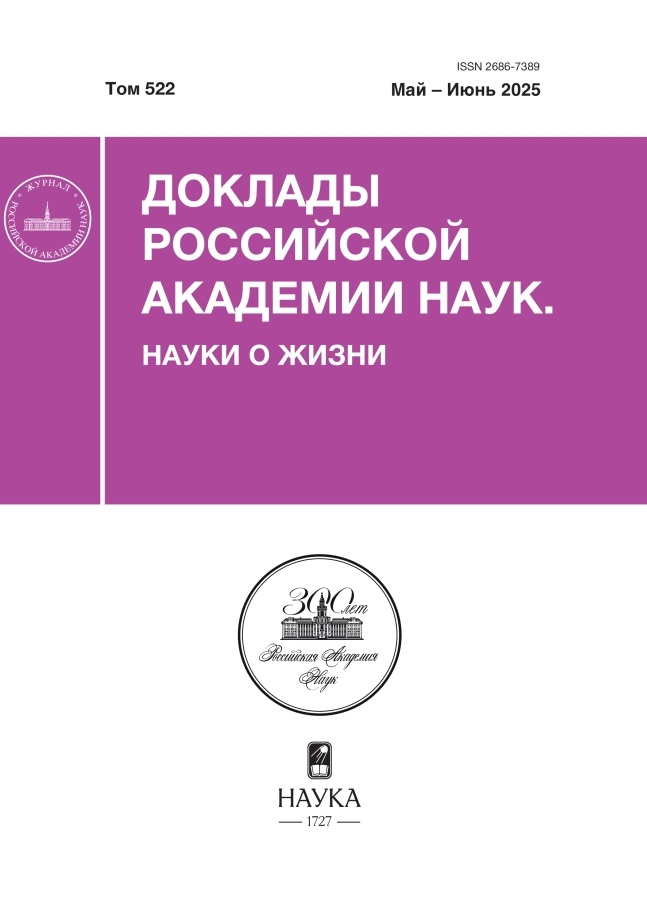Противоопухолевое действие ионов гелия с энергией 320 МэВ/ион при облучении асцитных клеток карциномы Эрлиха ex vivo
- Авторы: Балакин В.Е.1, Стрельникова Н.С.1, Розанова О.М.2, Смирнова Е.Н.2, Белякова Т.А.2,3, Шемяков А.Е.1,2
-
Учреждения:
- Федеральное государственное бюджетное учреждения науки Физический институт им. П.Н. Лебедева Российской академии наук
- Федеральное государственное бюджетное учреждение науки Институт теоретической и экспериментальной биофизики Российской академии наук
- Федеральное государственное бюджетное учреждение “Институт физики высоких энергий имени А.А. Логунова Национального исследовательского центра “Курчатовский институт”
- Выпуск: Том 522, № 1 (2025)
- Страницы: 351-357
- Раздел: Статьи
- URL: https://jdigitaldiagnostics.com/2686-7389/article/view/686380
- DOI: https://doi.org/10.31857/S2686738925030066
- ID: 686380
Цитировать
Полный текст
Аннотация
Исследовали закономерности индукции и роста опухолей у мышей при однократном облучении ex vivo пучком ионов гелия асцитных клеток аденокарциномы Эрлиха (АКЭ) в дозах 10 Гр и 20 Гр в двух положениях кривой Брэгга (до пика и в пике) в сравнении с рентгеновским излучением в тех же дозах. Показано, что частота индукции и задержка появления опухолей при действии ионов гелия зависит от дозы. Определены время пятикратного увеличения объема АКЭ, торможение роста опухоли, индекс роста опухоли (ИРО) и увеличение продолжительности жизни (УПЖ) мышей. Уменьшение значений ИРО и рост значений УПЖ происходили с увеличением дозы для всех видов излучений. Величина относительной биологической эффективности ионов гелия, определенная по площади под кривыми динамики роста АКЭ, достигала максимального значения 1.8 при облучении в пике Брэгга в дозе 20 Гр.
Ключевые слова
Полный текст
Об авторах
В. Е. Балакин
Федеральное государственное бюджетное учреждения науки Физический институт им. П.Н. Лебедева Российской академии наук
Email: strelnikova.ns@lebedev.ru
Член-корреспондент РАН, филиал “Физико-технический центр”
Россия, ПротвиноН. С. Стрельникова
Федеральное государственное бюджетное учреждения науки Физический институт им. П.Н. Лебедева Российской академии наук
Автор, ответственный за переписку.
Email: strelnikova.ns@lebedev.ru
Филиал “Физико-технический центр”
Россия, ПротвиноО. М. Розанова
Федеральное государственное бюджетное учреждение науки Институт теоретической и экспериментальной биофизики Российской академии наук
Email: strelnikova.ns@lebedev.ru
Россия, Пущино
Е. Н. Смирнова
Федеральное государственное бюджетное учреждение науки Институт теоретической и экспериментальной биофизики Российской академии наук
Email: strelnikova.ns@lebedev.ru
Россия, Пущино
Т. А. Белякова
Федеральное государственное бюджетное учреждение науки Институт теоретической и экспериментальной биофизики Российской академии наук; Федеральное государственное бюджетное учреждение “Институт физики высоких энергий имени А.А. Логунова Национального исследовательского центра “Курчатовский институт”
Email: strelnikova.ns@lebedev.ru
Россия, Пущино; Протвино
А. Е. Шемяков
Федеральное государственное бюджетное учреждения науки Физический институт им. П.Н. Лебедева Российской академии наук; Федеральное государственное бюджетное учреждение науки Институт теоретической и экспериментальной биофизики Российской академии наук
Email: strelnikova.ns@lebedev.ru
Филиал “Физико-технический центр”
Россия, Протвино; ПущиноСписок литературы
- Tommasino F., Scifoni E., Durante M. New Ions for therapy // Int. J. Part. Ther. 2015. Vol. 2. №3. Р. 428–38.
- Mairani A., Mein S., Blakely E., et al. Roadmap: helium ion therapy // Phys Med Biol. 2022. Vol. 67. №15.
- Tessonnier T., Mairani A., Brons S., et al. Helium ions at the heidelberg ion beam therapy center: comparisons between FLUKA Monte Carlo code predictions and dosimetric measurements // Phys Med Biol. 2017. Vol. 62. № 16. Р. 6784–6803.
- Krämer M., Scifoni E., Schuy C., et al. Helium ions for radiotherapy? Physical and biological verifications of a novel treatment modality // Med Phys. 2016. Vol. 43. №4. Р. 1995.
- Tessonnier T., Mairani A., Chen W., et al. Proton and helium ion radiotherapy for meningioma tumors: a Monte Carlo-based treatment planning comparison // Radiat Oncol. 2018. Vol. 13. №1. Р. 2.
- Levy R. P., Fabrikant J. I., Frankel K. A., et al. Heavy-charged-particle radiosurgery of the pituitary gland: clinical results of 840 patients // Stereotact Funct Neurosurg. 1991. Vol. 57. №1–2. Р. 22–35.
- Mishra K.K., Quivey J.M., Daftari I.K., et al. Long-term Results of the UCSF-LBNL Randomized Trial: Charged Particle With Helium Ion Versus Iodine-125 Plaque Therapy for Choroidal and Ciliary Body Melanoma // Int J Radiat Oncol Biol Phys. 2015. Vol. 92. №2. Р. 376–383.
- Durante M., Debus J., Loeffler J.S. Physics and biomedical challenges of cancer therapy with accelerated heavy ions // Nat Rev Phys. 2021. Vol. 3. №. 12. P. 777–790.
- Rozanova O.M., Smirnova E.N., Belyakova T.A., et al. Regularities of Induction and Growth of Tumors in Mice upon Irradiation of Ehrlich Carcinoma Cells ex vivo and in vivo with a Pencil Scanning Beam of Protons // Biofizika. 2024. Vol. 69. №.1. P. 183–192.
- Belyakova T.A., Rozanova O.M., Smirnova E.N., et al. Modifying effect of 1-b-D-arabinofuranosylcytosine on the growth of the solid tumor Ehrlich carcinoma in mice under in vivo and ex vivo proton irradiation of cells // Physics of Particles and Nuclei Letters. 2025. Vol. 22. №. 2. P. 477–486.
- Smith J. A., van den Broek F.A., Martorell J.C., et al. Principles and practice in ethical review of animal experiments across Europe: summary of the report of a FELASA working group on ethical evaluation of animal experiments // Lab Anim. 2007. Vol. 41. №2. Р. 143–160.
- Рыжова Н.И., Дерягина В.П., Савлучинская Л.А. Значение модели аденокарциномы Эрлиха в изучении механизмов канцерогенеза, противоопухолевой активности химических и физических факторов // Международный журнал прикладных и фундаментальных исследований. 2019. № 4. С. 220–227.
- Balakin V.E., Belyakova T.A., Rozanova O.M., et al. Anti-tumor Effect of High Doses of Carbon Ions and X-Rays during Irradiation of Ehrlich Ascites Carcinoma Cells ex vivo // Dokl Biochem Biophys. 2023. Vol. 513. № Suppl1. Р. S30–S35.
- Федоренко Б.С. Экспериментальные исследования биологической эффективности ускоренных заряженных частиц релятивистских энергий // Физика элементарных частиц и атомного ядра. 1991. Т. 22. №5. С. 1199–1229.
- Миронов А.Н., Бунатян А.С., Васильев А.Н. ред. Руководство по проведению доклинических исследований лекарственных средств. Часть первая. М.: Гриф и К, 2012.
- Spadinger I., Palcic B. The relative biological effectiveness of 60Co gamma-rays, 55 kVp X-rays, 250 kVp X-rays, and 11 MeV electrons at low doses // Int J Radiat Biol. 1992. Vol. 61. №3. P. 345–353.
- Balakin V.E., Rozanova O.M., Smirnova E.N., et al. Growth Induction of Solid Ehrlich Ascitic Carcinoma in Mice after Proton Irradiation of Tumor Cells ex vivo // Dokl Biochem Biophys. 2023. Vol. 511. №1. Р. 151–155.
- Стуков А.Н., Иванова М.А., Никитин А.К., и др. Индекс роста опухоли как интегральный критерий эффективности противоопухолевой терапии в эксперименте // Вопросы Онкологии. 2001. Т. 47. №5. С. 616–618.
Дополнительные файлы














